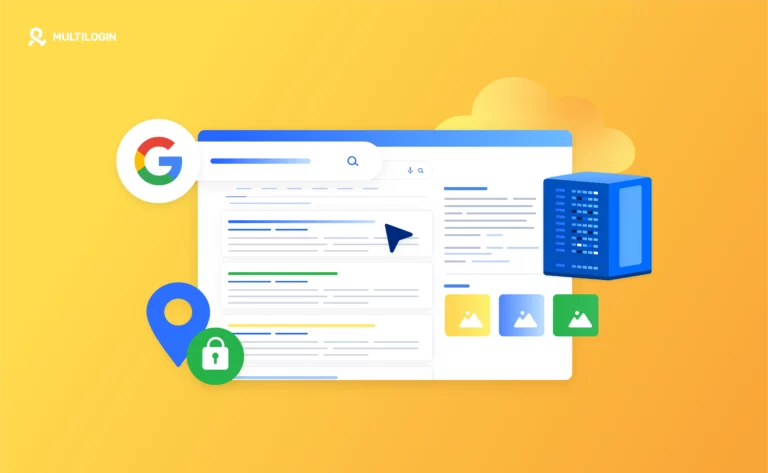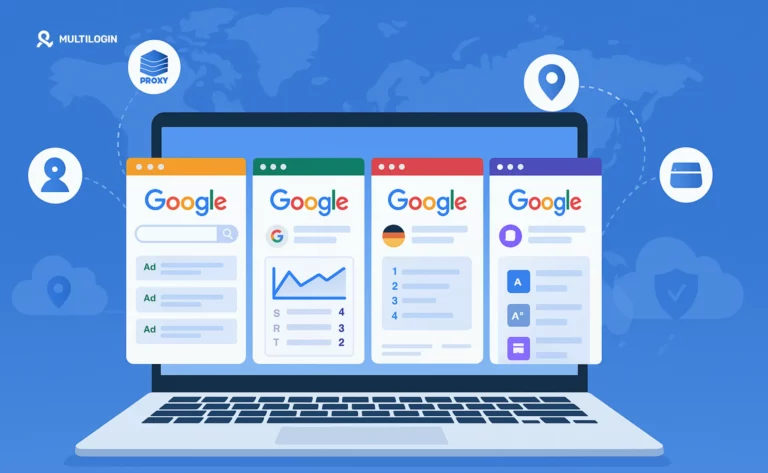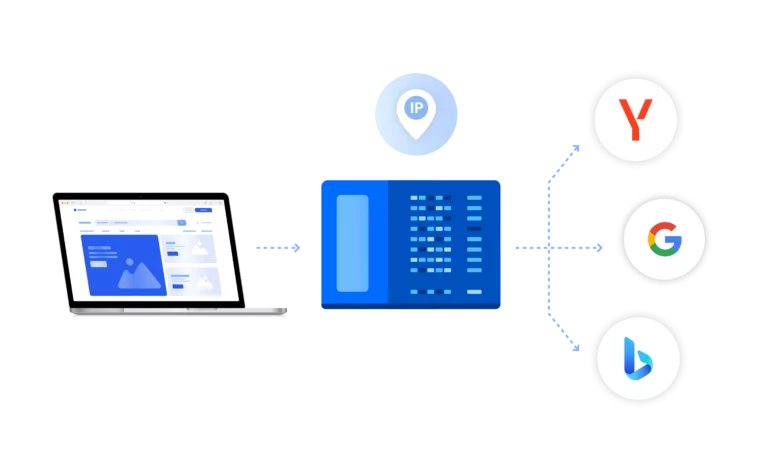Check Google SERP & Local SEO results
Detailed Explanation of Google Search URL Parameters
&hl (Language)
This parameter sets the interface language of Google (search results page, menus, settings, etc.). It also influences the language of content shown in SERPs.
- Example:
&hl=es→ Interface in Spanish. - Use case: User in Germany with
hl=rusees Russian interface and Russian results. - Reference: List of supported language codes available on Google’s support page.
&gl or &cl (Country/Region)
This parameter sets the geographic region bias for search results. It doesn’t change the interface language, but biases results toward a specific region.
- Example:
&gl=fr→ Prioritizes French sites and local content. - Note:
&clis older,&glis the modern standard. - Reference: Supported country codes are listed in Google documentation.
&uule (Precise Location)
This is a base64-encoded parameter that sets an exact location (city or neighborhood level). It overrides IP-based geo detection.
- Example:
&uule=w+CAIQICINV29ybGQ=→ Encoded location (e.g., “World”, “Paris, France”). - Why it matters: Provides more accurate testing than IP or
&gl. - Use case: Essential for local SEO rank check, SEO SERP checker, and local SERP checker.
How does Multilogin enhance your SEO workflow?
Try Multilogin Risk-Free — Just €1.99!
-
3-day access to Multilogin
-
5 cloud or local profiles
-
200 MB proxy traffic included
-
3-day access to Multilogin
-
5 cloud or local profiles
-
200 MB proxy traffic included
Why do pros use Multilogin for local SERP checks?
UULE tweaks the location in your query — but Google can still read your real browser fingerprint and IP.
Multilogin gives you real-user authenticity from any geo by launching fully isolated profiles with:
- unique, human-like fingerprints (25+ parameters)
- matched OS, timezone, language & locale
- separate cookies, cache & login states
- built-in residential proxies in every plan
That way your SERP looks like a genuine local user — not just a modified URL. Multilogin’s anti-fingerprinting is tested daily across 50+ sites and backed by 24/7 expert support in 5 languages.
Where UULE falls short
- Changes only the location parameter — not your fingerprint or IP
- Clicks can expose your true environment and revert relevance
- Applies mainly to the initial results page, not downstream behavior
→ For the most accurate local SERPs, combine UULE + Multilogin
(built-in residential proxy traffic + authentic fingerprints) and mirror a real user from that city end-to-end.
FAQ about Google SERP Checker
What is UULE?
UULE is a Google Search URL parameter that encodes a location (city, neighborhood, or GPS coordinates) so Google returns results as if the search came from there. It’s base64-encoded and comes in two main flavors: one based on Google’s “canonical” place names (Ads Geo Targets) and another based on GPS coordinates
Do people still need UULE?
Sometimes yes, sometimes no.
- Use UULE when you need to pinpoint a specific place (e.g., a neighborhood in a big city) or reproduce a client’s exact local SERP from another region.
- But UULE can misrepresent proximity-sensitive local packs if you only target “the city” instead of precise points—Google treats implicit (“tacos”) vs explicit (“tacos costa mesa”) geo-queries differently, so a single city-level UULE may not mirror what real users see across the city. Track multiple coordinates per market for better accuracy.
- For many spot checks, a local IP (residential proxy/VPN) plus gl/hl is good enough; for scalable tracking, consider SERP APIs that accept GPS coordinates (they handle UULE or equivalent for you).
How to use UULE (quick)
- Generate a UULE for your target place using a reputable generator.
- Append it to a Google URL with your query, plus gl (country) and hl (language).
or just use this page
Best-practice recipe for accurate local SERP checks
- Pick the right granularity: use multiple UULEs (different coordinates) across large cities; compare implicit vs explicit geo queries.
- Pair UULE with gl + hl to align country/language.
- Use local IP when possible; UULE isn’t a silver bullet if your IP screams “elsewhere.”
- For scale, use APIs (e.g., pass GPS) instead of hand-building URLs.
How do I track rankings by neighborhood?
Short answer: test multiple points inside the same city (a “neighborhood grid”), not just one city-level location.
How to do it
- Pick 4–8 coordinates that cover the city (north, south, east, west, downtown, suburbs).
- For each point, run the same query with a UULE (exact location), and also set
gl(country) andhl(interface language). Local packs are proximity-sensitive, so one city-level check is not enough. - Compare the local pack/map results across points; track both implicit (
pizza) and explicit (pizza brooklyn) queries. Tip for accuracy: use a true local IP when possible; UULE alone can’t perfectly mimic what a nearby searcher sees. For reliable city/area targeting at scale, use Multilogin’s built-in residential proxies and run your checks from genuinely local IPs.
What are gl, hl, uule in Google?
- gl = country hint/boost. Two-letter country code (e.g., gl=us). It nudges results toward that country. (Documented in Google’s Programmable Search docs.)
- hl (often confused with “cl”) = interface language (e.g., hl=en, hl=ru). It affects UI language and can influence results language.uule = base64-encoded precise location (neighborhood/city/GPS). Use it to emulate being in a specific place.
How can I see Google results as if I’m in [city]?
Use a UULE for that city + set gl/hl.
Template
https://www.google.com/search?q=[keyword]&uule=[UULE_HERE]&gl=[cc]&hl=[lang]
Generate the UULE for your target place (city, ZIP, or exact address) with a trusted generator; then paste it into the URL.
Example
.../search?q=plumber&uule=w+CAIQICIbQnJvb2tseW4sIE5Z&gl=us&hl=en
That forces Google to treat the search as coming from Brooklyn, US, in English.
For the closest match to real users, combine UULE with a local residential IP. Multilogin includes residential proxy traffic in every plan, so you can run checks from inside the target city without extra providers.
How can I check SERPs in any city without a proxy or VPN?
You can approximate results by adding uule (location), gl (country), and hl (language) to your URL. This is fine for directional checks, but it won’t perfectly reproduce proximity-driven local packs—IP and exact user location still matter.
If you need high confidence (client reporting, competitive tracking), switch to a true local IP. Multilogin’s all-in-one antidetect browser + built-in residential proxies lets you run those checks from the right city—no external proxy juggling—and it’s tested daily across 50+ sites.
How Local SEO works – Important Background
How Google Detects Your Location
The easiest way to check where Google thinks you are is to search for where am i (without brackets). You’ll see a Google Maps box showing your location on the map.
Another way: scroll to the bottom of the search results page (on desktop) — Google shows the location it’s using there.
Important Background
Back in October 2017, Google changed how search works: results are now tied to your actual location, not to the Google domain you’re using (like google.com, google.de, etc.).
For example, if you’re in the U.S., you can’t use google.com.br to see Brazilian results anymore. No matter which Google domain you visit, the results are based on your current location.
How to Work Around This
There are several options:
VPN — changes your IP address and location. Downside: good ones cost money.
Chrome DevTools → Sensors → Geolocation — lets you spoof your location in the browser. Downsides: the language of results doesn’t change, and it’s tedious if you need to check many places.
Chrome extensions (e.g., gs location changer) — easier to use but Chrome-only and requires access to your Google browsing data.
UULE (location), hl (language), gl (geo) parameters — allow you to directly control search results. This gives much more precision and flexibility.
Some tools are built on these parameters and let you set exact locations and choose from a wide list of countries and regions.
Common Myths About UULE
Myth 1. UULE is obsolete.
Wrong. In 2025, UULE is still highly relevant for local SEO, especially in competitive markets.
Myth 2. UULE shows exact local rankings.
Not quite. It gives a close approximation, but results can still shift based on:
mobile device location,
IP-based targeting,
real-time user behavior.
Advanced UULE Use Cases
Combine UULE with VPNs — for even more accurate simulations of real search experiences.
UULE for Google Ads — helps verify ad placements and confirm correct geo-targeting.
Competitive analysis — monitor how competitors rank across regions and uncover growth opportunities.
According to a 2024 Search Engine Journal survey, 72% of SEO professionals prioritize local SEO, which highlights the importance of tools like UULE.
Best Practice
The optimal setup is to use high-quality residential proxies + an anti-detect browser (e.g., Multilogin). This gives the most realistic view of search results for the region you want to target.
Improve your SERP tracking
Run multiple accounts without risking bans with Multilogin’s built-in proxies



